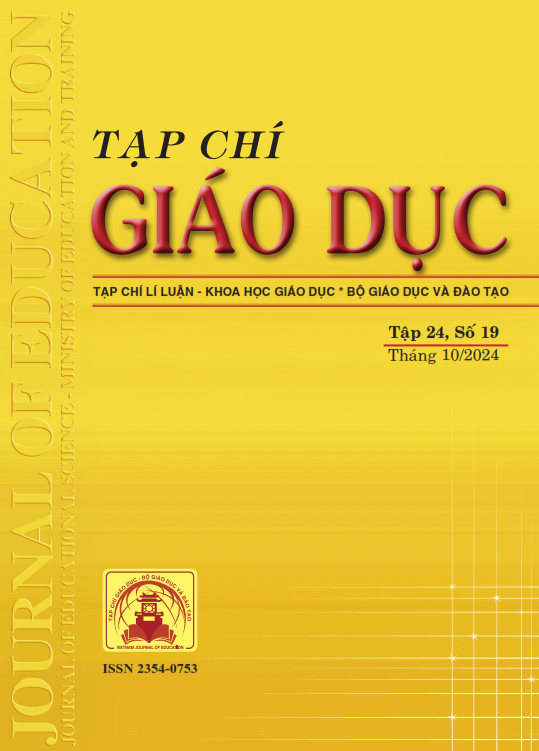Khả năng suy luận thống kê của học sinh trung học phổ thông: Phân tích bằng mô hình Rasch
Tóm tắt
Among many models of the Item Response Theory (IRT), the Rasch model is the simplest and most commonly used. Mathematician George Rasch has built a simple question characteristic function model that is widely used today. In this paper, we apply the Rasch model of the Item Response Theory (IRT) to analyze test questions and statistical reasoning ability of high school students. The results of the experimental study were analyzed with quantitative methods, the data were processed with QUEST and SPSS 20.0 software. The research subjects were 108 grade 10 students of Binh Giang High School, Binh Giang District, Hai Duong Province. The research results showed that the test questions had high reliability, the distribution of difficulty of the questions in the test covered the students' abilities. In terms of statistical reasoning, the surveyed students performed relatively well in basic skills such as calculating, reading and understanding charts presenting data. However, there were still limitations in applying statistical knowledge to analyze, explain and draw meaningful conclusions from given data. Another notable point is that there was no significant difference in statistical reasoning ability between male and female students.
Tài liệu tham khảo
Adams, R. J., & Khoo, S.-T. (1996). Quest: The interactive test analysis system. Melbourne ACER.
Baker, F. B. (2001). The basics of item response theory. ERIC Clearinghouse on Assessment and Evaluation.
Chiesi, F., & Primi, C. (2015). Gender differences in attitudes toward statistics: Is there a case for a confidence gap? CERME 9-Ninth congress of the European society for research in mathematics education, Charles University in Prague, Faculty of Education; ERME, Feb 2015, Prague, Czech Republic, pp. 622-628.
Chowdhury, S. (2018). Prior knowledge, sex and students' attitude towards statistics: a study on postgraduate education students. American Journal of Educational Research, 6(3), 270-276.
Delmas, R., Garfield, J., Ooms, A., & Chance, B. (2007). Assessing students’ conceptual understanding after a first course in statistics. Statistics Education Research Journal, 6(2), 28-58.
Garfield, J. B. (2003). Assessing statistical reasoning. Statistics Education Research Journal, 2(1), 22-38.
Garfield, J. B., Ben-Zvi, D., Chance, B., Medina, E., Roseth, C., & Zieffler, A. (2008). Developing students' statistical reasoning: Connecting research and teaching practice. Springer.
Garfield, J., & Ben-Zvi, D. (2008). Preparing school teachers to develop students’ statistical reasoning. Teaching Statistics in School Mathematics-Challenges for Teaching and Teacher Education: A Joint ICMI/IASE Study: The 18th ICMI Study, 299-310.
Garfield, J., & Chance, B. (2000). Assessment in statistics education: Issues and challenges. Mathematical Thinking Learning, 2(1-2), 99-125.
Georg, R. (1960). Probabilistic models for some intelligence and attainment tests. Copenhagen: Institute of Education Research.
Hoàng Lê Minh (2023). Xây dựng môi trường học tập nội dung thống kê ở trường trung học phổ thông theo hướng rèn luyện kĩ năng suy luận thống kê cho học sinh. Luận án tiến sĩ Khoa học Giáo dục, Trường Đại học Vinh.
Hoàng Nam Hải (2013). Phát triển năng lực suy luận thống kê cho sinh viên cao đẳng chuyên nghiệp. Luận án tiến sĩ Giáo dục học, Trường Đại học Vinh.
Lâm Quang Thiệp (2010). Đo lường trong giáo dục, lí thuyết và ứng dụng. NXB Đại học Quốc gia Hà Nội.
Liu, H.-J. C., & Garfield, J. B. (2002). Sex differences in statistical reasoning. Bulletin of Educational Psychology, 34(1), 123-137.
Morales, R. A. (2009). Evaluation of mathematics achievement test: A comparison between CTT and IRT. The International Journal of Educational Psychological Assessment, 1(1), 19-26.
Quách Thị Sen (2020). Phát triển tư duy thống kê cho sinh viên đại học ngành dược trong dạy học Toán - thống kê y dược. Luận án tiến sĩ Khoa học Giáo dục, Trường Đại học Sư phạm Hà Nội.
Sabbag, A. G., & Zieffler, A. (2015). Assessing learning outcomes: An analysis of the GOALS-2 instrument. Statistics Education Research Journal, 14(2), 93-116.
Trần Đức Chiển (2007). Rèn luyện tư duy thống kê cho học sinh trong dạy học thống kê - xác suất ở môn Toán trung học phổ thông. Luận án tiến sĩ Giáo dục học, Viện Khoa học Giáo dục Việt Nam.
Tải xuống
Đã Xuất bản
Cách trích dẫn
Số
Chuyên mục
Giấy phép

Tác phẩm này được cấp phép theo Ghi nhận tác giả của Creative Commons Giấy phép quốc tế 4.0 .












